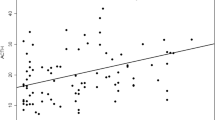Abstract
OBJECTIVE: Although some studies have shown cortisol nonsuppression following dexamethasone suppression test (DST) in current bulimia nervosa (BN), no study has looked at HPA axis abnormalities in behaviorally recovered BN patients. The purpose of this pilot study is to explore the role of current vs behaviorally recovered BN, as well as depression and childhood trauma in cortisol suppression in BN. METHODS: A 0.5 mg DST was performed on 21 patients with behaviorally recovered BN, 9 women with current BN and 14 controls. BN group also completed the Hamilton Depression Rating Scale and Childhood Trauma Questionnaire. RESULTS: There were no differences between the three groups in cortisol suppression, and BMI was not associated with cortisol levels following DST. Within the BN group, depression was significantly associated with afternoon cortisol nonsuppression (p=0.005). DISCUSSION: As researchers look for more accurate ways to identify biological phenotypes of BN, presence of comorbid depression may help explain differences in cortisol suppression.
Similar content being viewed by others
References
American Psychiatric Association. Diagnostic and Statistical Manual of Mental Disorders (4th ed, text revision), 2000.
Kaplan AS, Garfinkel PE, Brown GM. The DST and TRH test in bulimia nervosa. Br J Psychiatry 1989; 154: 86–92.
Neudeck P, Jacoby GE, Florin I. Dexamethasone suppression test using saliva cortisol measurement in bulimia nervosa. Physiol Behav 2001; 72: 93–8.
Levitan RD, Kaplan AS, Brown GM, et al. Low plasma cortisol in bulimia nervosa patients with reversed neurovegetative symptoms of depression. Biol Psychiatry 1997; 41: 366–8.
Steiger H, Gauvin L, Israel M, et al. Association of serotonin and cortisol indices with childhood abuse in bulimia nervosa. Arch Gen Psychiatry 2001; 58: 837–43.
Diaz-Marsa M, Carrasco JL, Basurte E, et al. Findings with 0.25 mg dexamethasone suppression test in eating disorders: association with childhood trauma. CNS Spectr 2007; 12: 675–80.
Newport DJ, Heim C, Bonsall R, et al. Pituitary-adrenal responses to standard and low-dose dexamethasone suppression tests in adult survivors of child abuse. Biol Psychiatry 2004; 55: 10–20.
Author information
Authors and Affiliations
Corresponding author
Rights and permissions
About this article
Cite this article
Yilmaz, Z., Kaplan, A.S. & Levitan, R.D. The role of depression and childhood trauma on cortisol suppression in women with bulimia nervosa: A pilot study. Eat Weight Disord 17, e17–e21 (2012). https://doi.org/10.1007/BF03325324
Received:
Accepted:
Published:
Issue Date:
DOI: https://doi.org/10.1007/BF03325324




